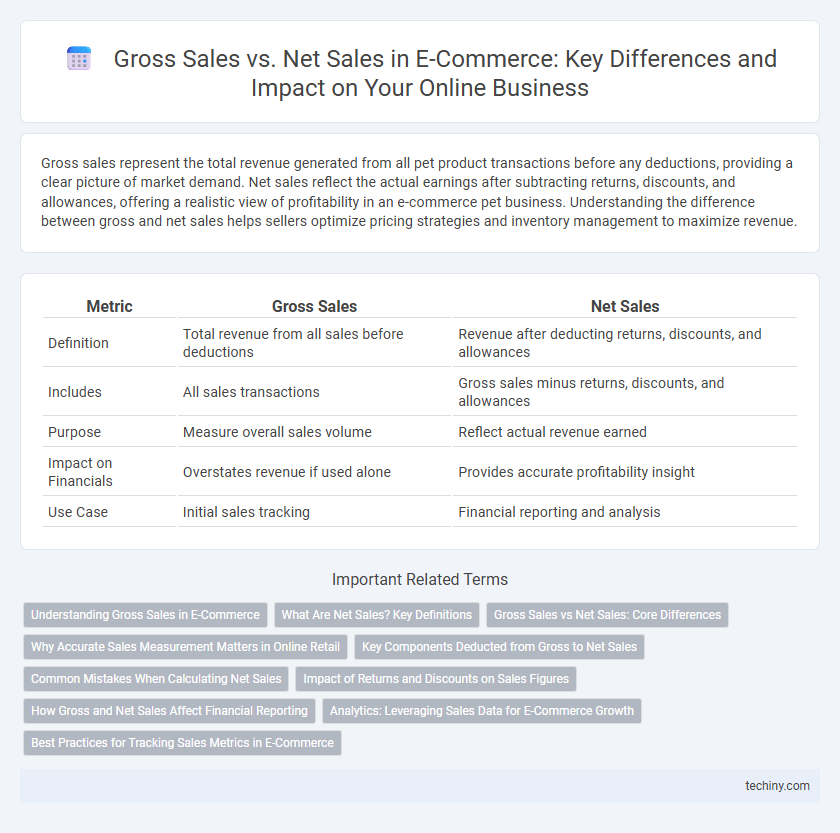Gross sales represent the total revenue generated from all pet product transactions before any deductions, providing a clear picture of market demand. Net sales reflect the actual earnings after subtracting returns, discounts, and allowances, offering a realistic view of profitability in an e-commerce pet business. Understanding the difference between gross and net sales helps sellers optimize pricing strategies and inventory management to maximize revenue.
Table of Comparison
| Metric | Gross Sales | Net Sales |
|---|---|---|
| Definition | Total revenue from all sales before deductions | Revenue after deducting returns, discounts, and allowances |
| Includes | All sales transactions | Gross sales minus returns, discounts, and allowances |
| Purpose | Measure overall sales volume | Reflect actual revenue earned |
| Impact on Financials | Overstates revenue if used alone | Provides accurate profitability insight |
| Use Case | Initial sales tracking | Financial reporting and analysis |
Understanding Gross Sales in E-Commerce
Gross sales in e-commerce represent the total revenue generated from all sales transactions before deducting returns, discounts, or allowances. This metric provides insight into the overall market demand and sales volume, serving as a crucial indicator of business growth. Monitoring gross sales helps e-commerce businesses evaluate their pricing strategies and marketing effectiveness without accounting for post-sale adjustments.
What Are Net Sales? Key Definitions
Net sales represent the total revenue generated from e-commerce transactions after deducting returns, discounts, and allowances. Unlike gross sales, which reflect the sum of all sales before adjustments, net sales provide a clearer picture of actual income earned. Understanding net sales is crucial for assessing an online store's true profitability and operational efficiency.
Gross Sales vs Net Sales: Core Differences
Gross sales represent the total revenue generated from all sales transactions before any deductions, while net sales reflect the amount remaining after subtracting returns, discounts, and allowances. Understanding the core differences between gross sales and net sales is essential for accurate financial analysis and inventory management in e-commerce businesses. Net sales provide a clearer picture of actual revenue, aiding in profit calculation and strategic decision-making.
Why Accurate Sales Measurement Matters in Online Retail
Accurate sales measurement in online retail directly impacts inventory management, financial forecasting, and marketing strategies, making the distinction between Gross Sales and Net Sales crucial. Gross Sales reflect the total revenue generated, while Net Sales account for returns, discounts, and allowances, providing a more precise indicator of actual business performance. Leveraging real-time data analytics to monitor Net Sales ensures better decision-making and improved profitability in e-commerce operations.
Key Components Deducted from Gross to Net Sales
Gross sales represent the total revenue generated from all e-commerce transactions before any deductions. Key components deducted from gross sales to calculate net sales include returns, allowances, and sales discounts, which directly reduce the total revenue. Understanding these deductions is crucial for accurate financial analysis and assessing the true profitability of an e-commerce business.
Common Mistakes When Calculating Net Sales
Common mistakes when calculating net sales in e-commerce include neglecting to deduct returns, discounts, and allowances from gross sales, which leads to inflated revenue figures. Confusing gross sales with net sales results in inaccurate financial analysis and poor inventory management decisions. Properly adjusting for returns and promotional deductions ensures precise net sales figures critical for effective business forecasting and profitability assessment.
Impact of Returns and Discounts on Sales Figures
Gross sales represent the total revenue generated from all products sold before deductions, while net sales account for returns, discounts, and allowances, providing a more accurate reflection of actual revenue. Returns reduce net sales by subtracting the value of refunded or exchanged items, directly impacting profitability in e-commerce platforms. Discounts lower the sale price, decreasing gross sales and thus net sales, but can boost customer acquisition and sales volume, emphasizing the importance of balancing promotional strategies.
How Gross and Net Sales Affect Financial Reporting
Gross sales represent the total revenue from all sales before deductions, directly impacting the top line of financial statements and showcasing overall business activity. Net sales, which subtract returns, allowances, and discounts from gross sales, provide a more accurate measure of actual revenue and profitability, crucial for precise financial reporting. Understanding the distinction between gross and net sales ensures better inventory management, tax calculations, and investor insights in e-commerce financial analysis.
Analytics: Leveraging Sales Data for E-Commerce Growth
Gross sales represent the total revenue generated from all e-commerce transactions before deductions, providing a broad view of market demand and customer purchasing behavior. Net sales offer a refined metric by subtracting returns, discounts, and allowances, enabling more accurate profit analysis and inventory management. Leveraging these sales data metrics through analytics tools helps e-commerce businesses identify trends, optimize pricing strategies, and improve overall operational efficiency for sustained growth.
Best Practices for Tracking Sales Metrics in E-Commerce
Gross Sales represent the total revenue generated from all transactions before deductions, while Net Sales account for returns, discounts, and allowances, providing a more accurate measure of actual income. Best practices for tracking sales metrics in e-commerce include integrating real-time analytics tools, regularly reconciling data with payment gateways, and segmenting sales by product categories and customer demographics to identify trends. Accurate differentiation between Gross and Net Sales enables better inventory management, financial forecasting, and strategic decision-making.
Gross Sales vs Net Sales Infographic

 techiny.com
techiny.com